Avoid being scammed by "YOU ARE THE CHOSEN!" pop-up
Phishing/ScamAlso Known As: YOU ARE THE CHOSEN! pop-up
Get free scan and check if your device is infected.
Remove it nowTo use full-featured product, you have to purchase a license for Combo Cleaner. Seven days free trial available. Combo Cleaner is owned and operated by RCS LT, the parent company of PCRisk.com.
What is "YOU ARE THE CHOSEN!"?
"YOU ARE THE CHOSEN!" is a scam run by deceptive websites. It claims that visitors have been chosen and can win a special reward.
These scams are simply intended to generate revenue for their designers. They must never be trusted, as doing so can lead to serious issues. Sites that promote "YOU ARE THE CHOSEN!" and similar scams are typically accessed via redirects caused by intrusive ads or Potentially Unwanted Applications (PUAs) already infiltrated into the system.
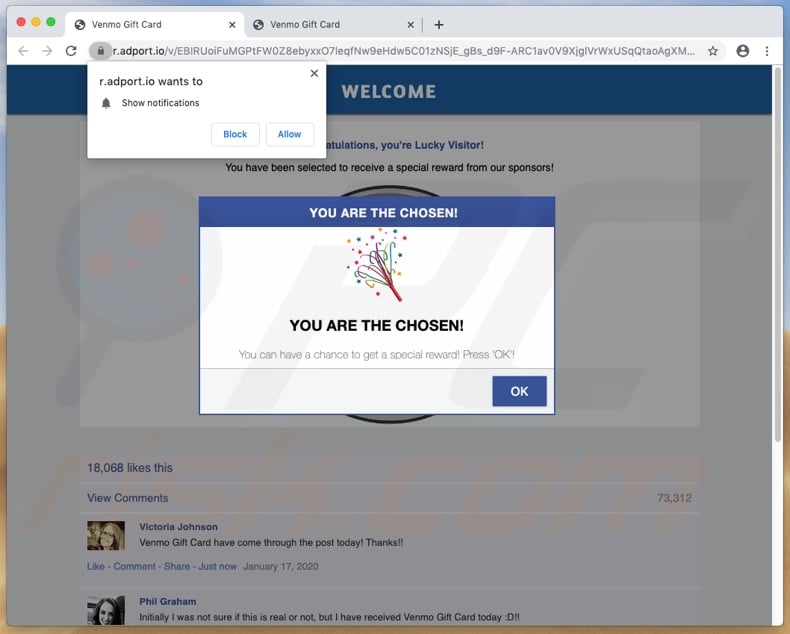
Visitors to websites running the "YOU ARE THE CHOSEN!" scam first see a pop-up window claiming that they have been chosen and have the chance of receiving a special reward. When this window is closed, users are presented with a "wheel-of-fortune" prize draw.
The wheel consists of potential prize images and "1 [more] spin" cells. It might take several spins for the arrow to land on a fake prize and, when it does, users are presented with another pop-up. This congratulates them for winning a Venmo gift card. While Venmo is a genuine payment service owned by PayPal, the alleged gift card is fake.
By using the names of legitimate services, scams further giver the impression of legitimacy. The text presented in the window urges users to accept the gift, as they supposedly have just five minutes to claim them.
They are instructed to provide their information in the next page to claim the prize. Clicking the "OK" button redirects to another site, which informs visitors that they need to answer a few questions to proceed towards their reward, however, the small print clarifies that they can only receive the prize upon completion of unspecified purchase requirements.
Users are then redirected to yet another deceptive/scam web page. You are strongly advised against trusting the "YOU ARE THE CHOSEN!" scam, as it is highly likely to lead to a number of serious problems.
One of the main causes of redirects to scam websites are PUAs, which can open various untrustworthy, rogue, sale-based, compromised or even malicious web pages. Unwanted apps can also deliver intrusive advertisements, which diminish the browsing experience, cause redirects to dangerous web pages and stealthily download/install unwanted content (e.g. PUAs).
Other applications within this category can hijack browsers, limit/deny access to their settings and promote bogus search engines. Most PUAs (regardless of their specific capabilities) can track data. They can monitor users' browsing habits (URLs visited, search queries typed, etc.) and collect personal information (IP addresses, geolocations and other details).
This vulnerable data can then be shared with third parties (potentially, cyber criminals) intent on misusing it for profit. To summarize, PUAs can cause browser/system infiltration and infections, lead to serious privacy issues, financial loss and even identity theft. To ensure device/user safety, remove all suspect applications and browser extensions/plug-ins without delay.
| Name | YOU ARE THE CHOSEN! pop-up |
| Threat Type | Phishing, Scam, Social Engineering, Fraud. |
| Fake Claim | Scam claims users can win a prize. |
| Related Domains | adport[.]io |
| Serving IP Address (adport[.]io) | 104.20.171.28 |
| Detection Names (adport[.]io) | CRDF (Malicious), Full List Of Detections (VirusTotal) |
| Symptoms | Fake error messages, fake system warnings, pop-up errors, hoax computer scan. |
| Distribution methods | Compromised websites, rogue online pop-up ads, potentially unwanted applications. |
| Damage | Loss of sensitive private information, monetary loss, identity theft, possible malware infections. |
| Malware Removal (Windows) |
To eliminate possible malware infections, scan your computer with legitimate antivirus software. Our security researchers recommend using Combo Cleaner. Download Combo CleanerTo use full-featured product, you have to purchase a license for Combo Cleaner. 7 days free trial available. Combo Cleaner is owned and operated by RCS LT, the parent company of PCRisk.com. |
"SPECIAL AWARD FROM OUR SPONSORS", "International promotion of postal services" and "Like Of The Year" are some examples of other scams.
This scam model (fake prize/award) is mostly used to trick people into revealing personal information (e.g. identity, banking, credit card and similar details) and/or making monetary transactions (e.g. "delivery", "shipping", "packing" fees or other "payments").
Other scam types include warnings that the system is infected, an essential piece of software is outdated/missing, or they present "amazing" offers and so on. Trusting these schemes can lead to download/installation and/or purchase of nonoperational, untrustworthy or malicious content, financial loss and can endanger users' privacy/safety.
How did potentially unwanted applications install on my computer?
Some PUAs have "official" download pages, which are commonly promoted by deceptive sites, however, they can also be downloaded/installed together with other programs. "Bundling" is the term used to define this deceptive marketing technique of packing normal content with unwanted or malicious software.
Rushing download/install processes (e.g. skipping steps and sections, etc.) increases the risk of potential system infiltration and infections. When clicked, intrusive ads can execute scripts designed to download/install PUAs without users' consent.
How to avoid installation of potentially unwanted applications
Research all products prior to download/installation and/or purchase. Use only official and verified download sources. Untrustworthy download channels such as free file-hosting websites, Peer-to-Peer sharing networks (BitTorrent, eMule, Gnutella, etc.) and other third party downloaders should be avoided.
When downloading/installing, read the terms, explore all available options, use the "Custom/Advanced" settings and opt-out of supplementary apps, tools, features and so on. Intrusive ads typically seem legitimate and innocuous, however, they can redirect to dubious web pages (e.g. pornography, adult-dating, gambling and others).
If you encounter advertisements/redirects of this kind, inspect the device and immediately remove all dubious applications and/or browser extensions/plug-ins. If your computer is already infected with PUAs, we recommend running a scan with Combo Cleaner Antivirus for Windows to automatically eliminate them.
Text presented in the initial pop-up of the "YOU ARE THE CHOSEN!" scam:
YOU ARE THE CHOSEN!
You can have a chance to get a special reward! Press 'OK'!
Text presented in the background:
WELCOME
Congratulations, you're Lucky Visitor!You have been selected to receive a special reward from our sponsors!
Text presented in the pop-up displayed after the wheel stops on "1 spin":
Good Luck
You got (1) Extra Spin!
Screenshot of the pop-up congratulating users on winning:
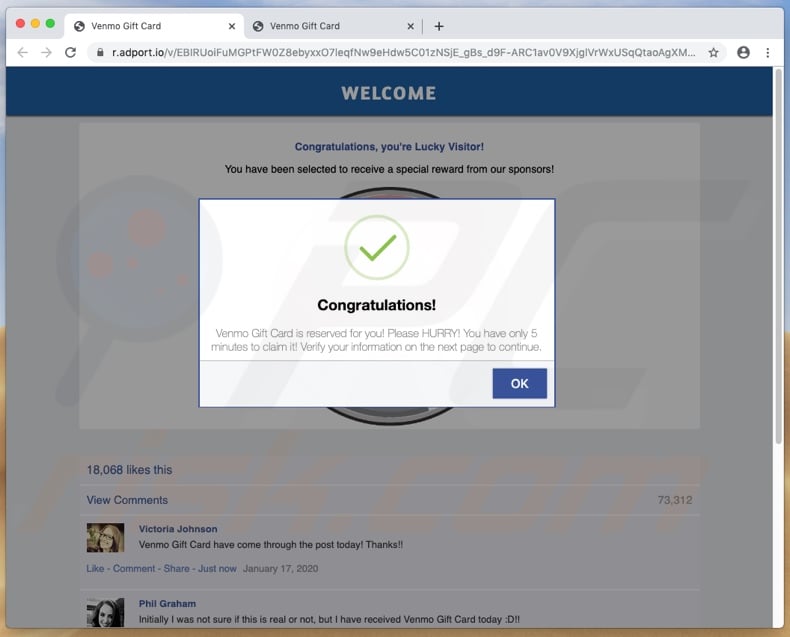
Text presented in this pop-up:
Congratulations!
Venmo Gift Card is reserved for you! Please HURRY! You have only 5 minutes to claim it! Verify your information on the next page to continue.
Screenshot of the website to which "YOU ARE THE CHOSEN!" initially redirects:
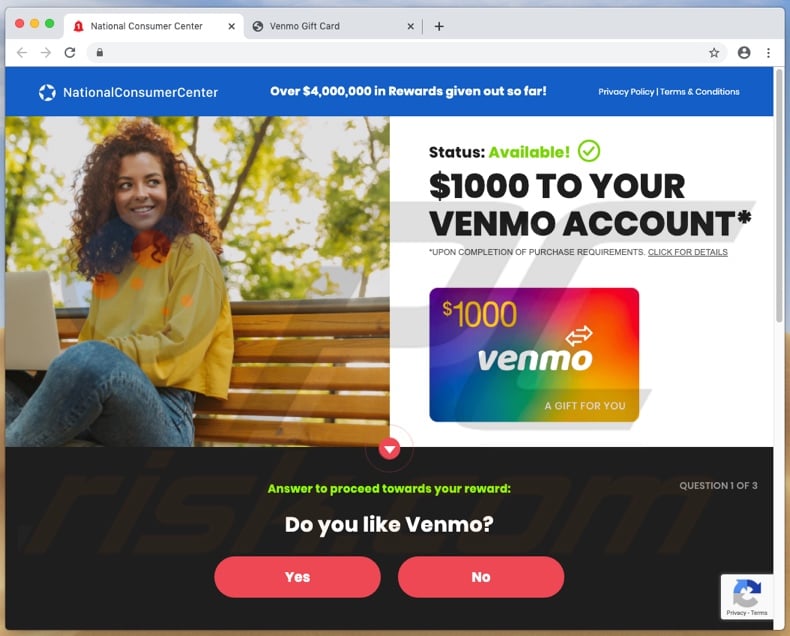
Screenshot of the next website redirect:
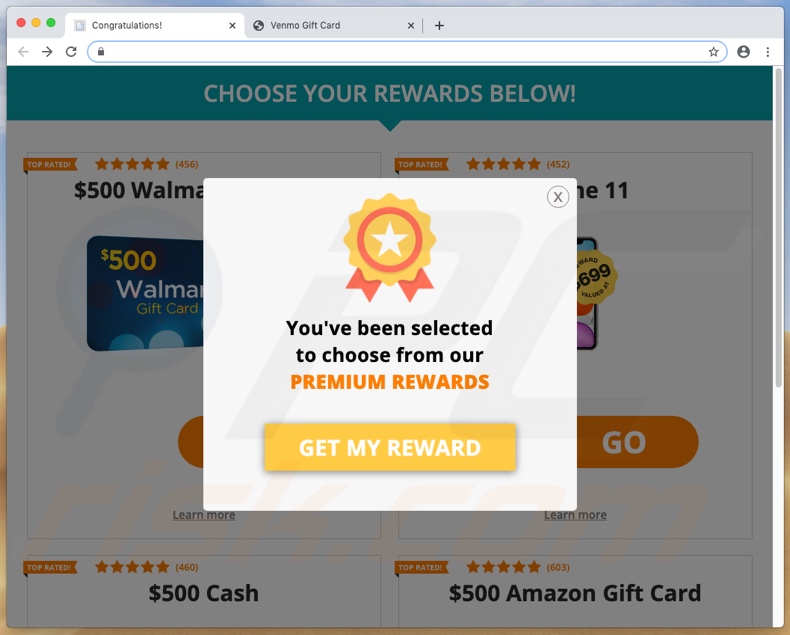
The appearance of "YOU ARE THE CHOSEN!" scam (GIF):
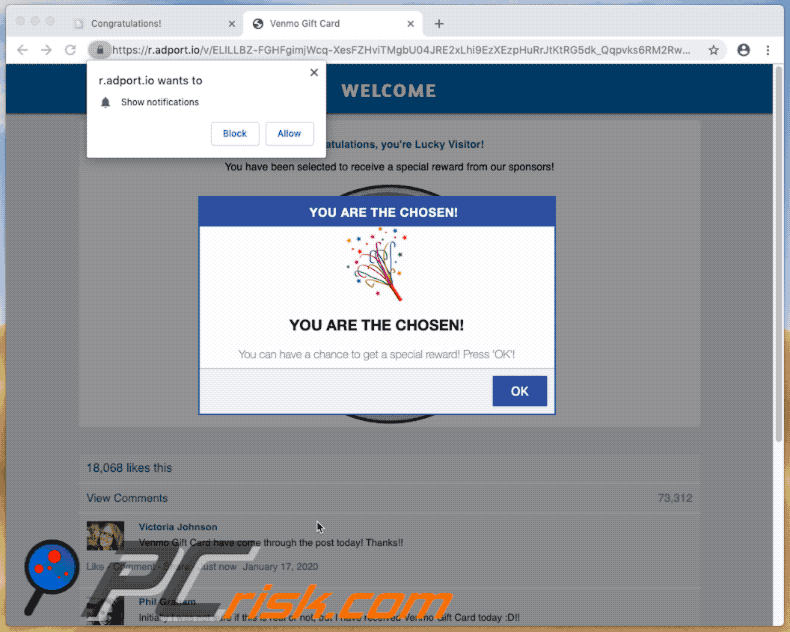
IMPORTANT NOTE! This deceptive site asks to enable web browser notifications.
Therefore, before commencing, perform these steps:
Google Chrome (PC):
- Click the Menu button (three dots) on the right upper corner of the screen
- Select "Settings", scroll down to the bottom and click "Advanced"
- Scroll down to the "Privacy and security" section, select "Content settings" and then "Notifications"
- Click three dots on the right hand side of each suspicious URL and click "Block" or "Remove" (if you click "Remove" and visit the malicious site once more, it will ask to enable notifications again)
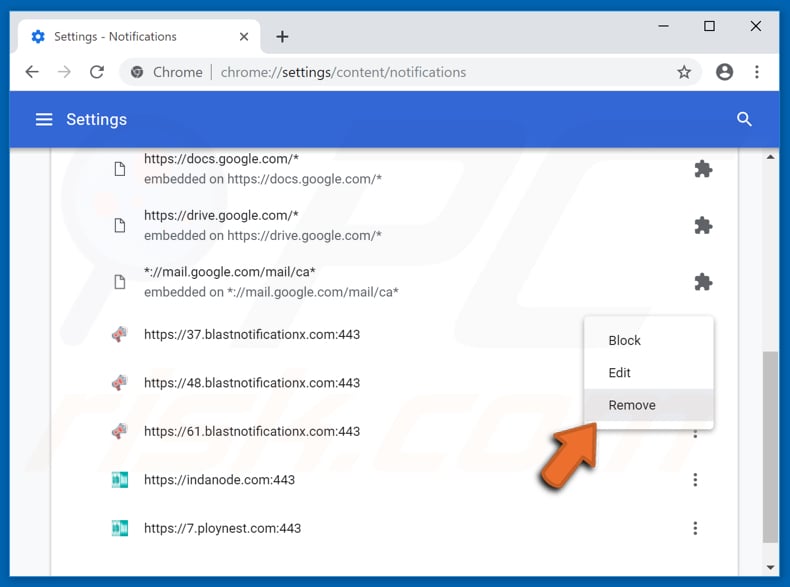
Google Chrome (Android):
- Click on the Menu button (three dots) on the right upper corner of the screen and click "Settings"
- Scroll down, click on "Site settings" and then "Notifications"
- In the opened window, locate all suspicious URLs and click on them one-by-one
- Select "Notifications" in the "Permissions" section and set the toggle button to "OFF"
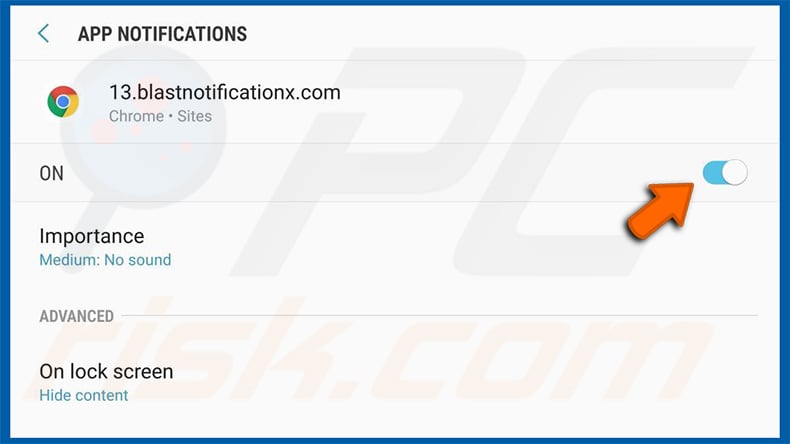
Mozilla Firefox:
- Click the Menu button (three bars) on the right upper corner of the screen
- Select "Options" and click on "Privacy & Security" in the toolbar on the left hand side of the screen
- Scroll down to the "Permissions" section and click the "Settings" button next to "Notifications"
- In the opened window, locate all suspicious URLs, click the drop-down menu and select "Block"
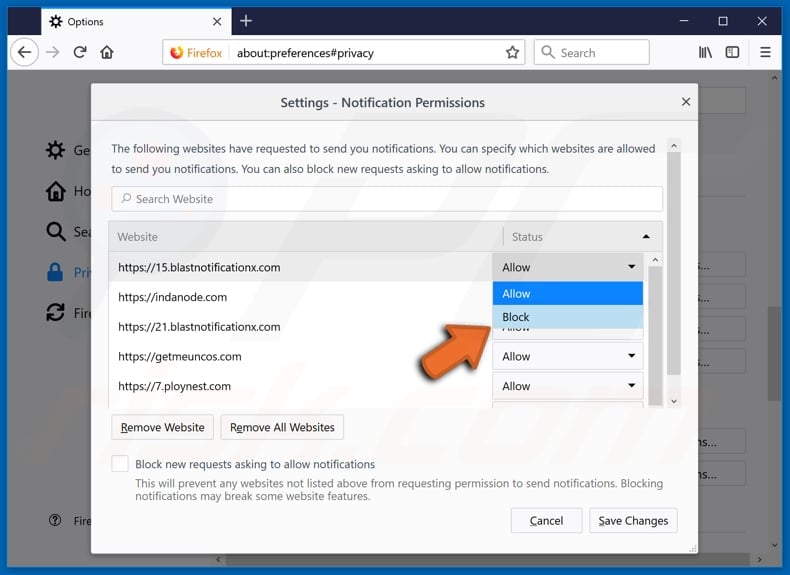
Internet Explorer:
- Click the Gear button on the right upper corner of the IE window
- Select "Internet options"
- Select the "Privacy" tab and click "Settings" under "Pop-up Blocker" section
- Select suspicious URLs under and remove them one by one by clicking the "Remove" button
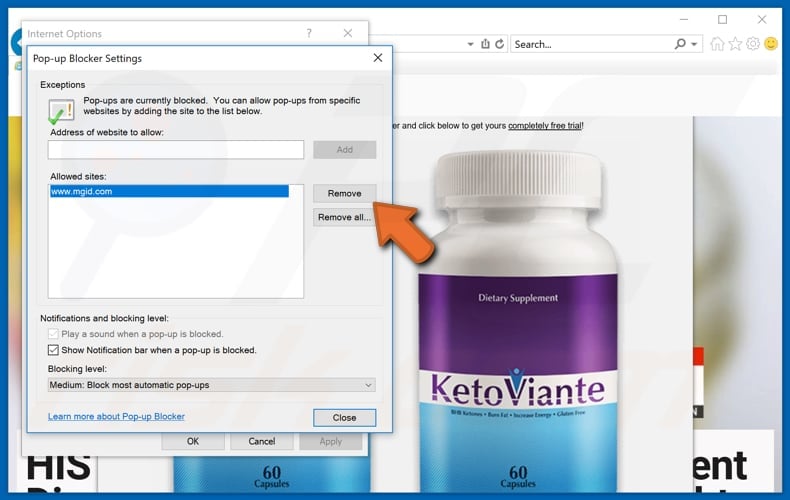
Microsoft Edge:
- Click the menu button (three dots) on the right upper corner of the Edge window
- Scroll down, find and click "Settings"
- Scroll down again and click "View advanced settings"
- Click "Manage" under "Website permissions"
- Click the switch under each suspicious website
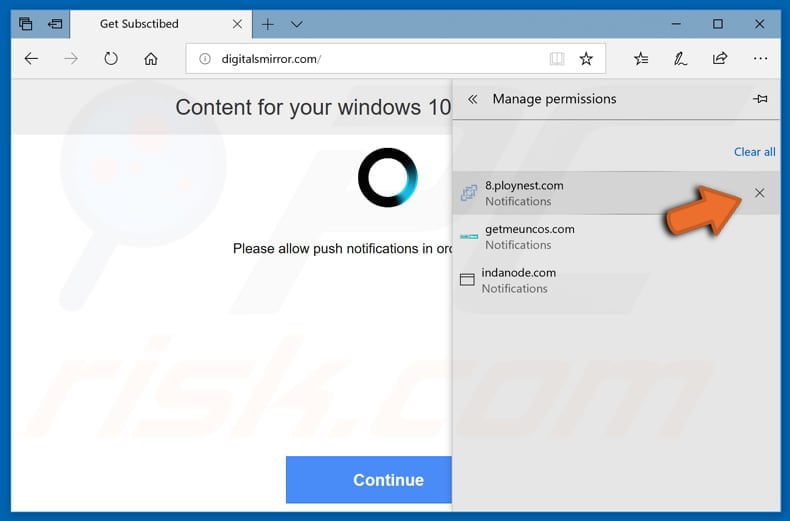
Safari (Mac):
- Click "Safari" button on the left upper corner of the screen and select "Preferences..."
- Select the "Websites" tab and then select "Notifications" section on the left pane
- Check for suspicious URLs and apply the "Deny" option for each
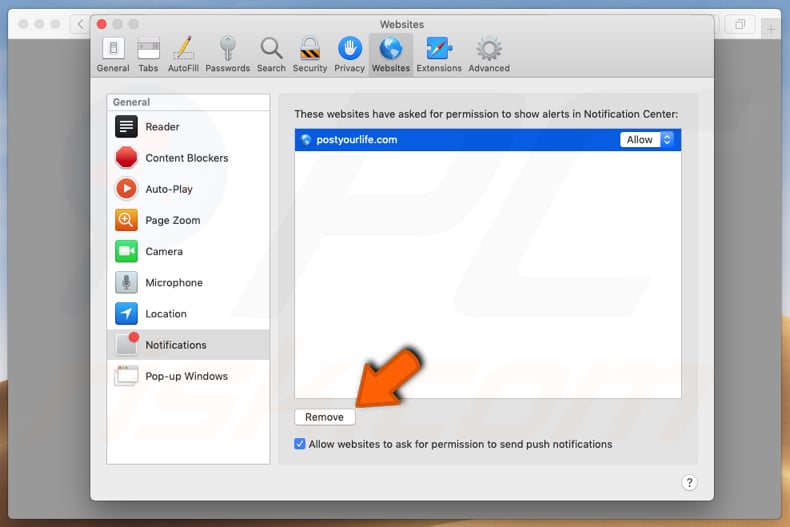
Instant automatic malware removal:
Manual threat removal might be a lengthy and complicated process that requires advanced IT skills. Combo Cleaner is a professional automatic malware removal tool that is recommended to get rid of malware. Download it by clicking the button below:
DOWNLOAD Combo CleanerBy downloading any software listed on this website you agree to our Privacy Policy and Terms of Use. To use full-featured product, you have to purchase a license for Combo Cleaner. 7 days free trial available. Combo Cleaner is owned and operated by RCS LT, the parent company of PCRisk.com.
Quick menu:
- What is YOU ARE THE CHOSEN! pop-up?
- How to identify a pop-up scam?
- How do pop-up scams work?
- How to remove fake pop-ups?
- How to prevent fake pop-ups?
- What to do if you fell for a pop-up scam?
How to identify a pop-up scam?
Pop-up windows with various fake messages are a common type of lures cybercriminals use. They collect sensitive personal data, trick Internet users into calling fake tech support numbers, subscribe to useless online services, invest in shady cryptocurrency schemes, etc.
While in the majority of cases these pop-ups don't infect users' devices with malware, they can cause direct monetary loss or could result in identity theft.
Cybercriminals strive to create their rogue pop-up windows to look trustworthy, however, scams typically have the following characteristics:
- Spelling mistakes and non-professional images - Closely inspect the information displayed in a pop-up. Spelling mistakes and unprofessional images could be a sign of a scam.
- Sense of urgency - Countdown timer with a couple of minutes on it, asking you to enter your personal information or subscribe to some online service.
- Statements that you won something - If you haven't participated in a lottery, online competition, etc., and you see a pop-up window stating that you won.
- Computer or mobile device scan - A pop-up window that scans your device and informs of detected issues - is undoubtedly a scam; webpages cannot perform such actions.
- Exclusivity - Pop-up windows stating that only you are given secret access to a financial scheme that can quickly make you rich.
Example of a pop-up scam:

How do pop-up scams work?
Cybercriminals and deceptive marketers usually use various advertising networks, search engine poisoning techniques, and shady websites to generate traffic to their pop-ups. Users land on their online lures after clicking on fake download buttons, using a torrent website, or simply clicking on an Internet search engine result.
Based on users' location and device information, they are presented with a scam pop-up. Lures presented in such pop-ups range from get-rich-quick schemes to fake virus scans.
How to remove fake pop-ups?
In most cases, pop-up scams do not infect users' devices with malware. If you encountered a scam pop-up, simply closing it should be enough. In some cases scam, pop-ups may be hard to close; in such cases - close your Internet browser and restart it.
In extremely rare cases, you might need to reset your Internet browser. For this, use our instructions explaining how to reset Internet browser settings.
How to prevent fake pop-ups?
To prevent seeing pop-up scams, you should visit only reputable websites. Torrent, Crack, free online movie streaming, YouTube video download, and other websites of similar reputation commonly redirect Internet users to pop-up scams.
To minimize the risk of encountering pop-up scams, you should keep your Internet browsers up-to-date and use reputable anti-malware application. For this purpose, we recommend Combo Cleaner Antivirus for Windows.
What to do if you fell for a pop-up scam?
This depends on the type of scam that you fell for. Most commonly, pop-up scams try to trick users into sending money, giving away personal information, or giving access to one's device.
- If you sent money to scammers: You should contact your financial institution and explain that you were scammed. If informed promptly, there's a chance to get your money back.
- If you gave away your personal information: You should change your passwords and enable two-factor authentication in all online services that you use. Visit Federal Trade Commission to report identity theft and get personalized recovery steps.
- If you let scammers connect to your device: You should scan your computer with reputable anti-malware (we recommend Combo Cleaner Antivirus for Windows) - cyber criminals could have planted trojans, keyloggers, and other malware, don't use your computer until removing possible threats.
- Help other Internet users: report Internet scams to Federal Trade Commission.
Share:

Tomas Meskauskas
Expert security researcher, professional malware analyst
I am passionate about computer security and technology. I have an experience of over 10 years working in various companies related to computer technical issue solving and Internet security. I have been working as an author and editor for pcrisk.com since 2010. Follow me on Twitter and LinkedIn to stay informed about the latest online security threats.
PCrisk security portal is brought by a company RCS LT.
Joined forces of security researchers help educate computer users about the latest online security threats. More information about the company RCS LT.
Our malware removal guides are free. However, if you want to support us you can send us a donation.
DonatePCrisk security portal is brought by a company RCS LT.
Joined forces of security researchers help educate computer users about the latest online security threats. More information about the company RCS LT.
Our malware removal guides are free. However, if you want to support us you can send us a donation.
Donate
▼ Show Discussion